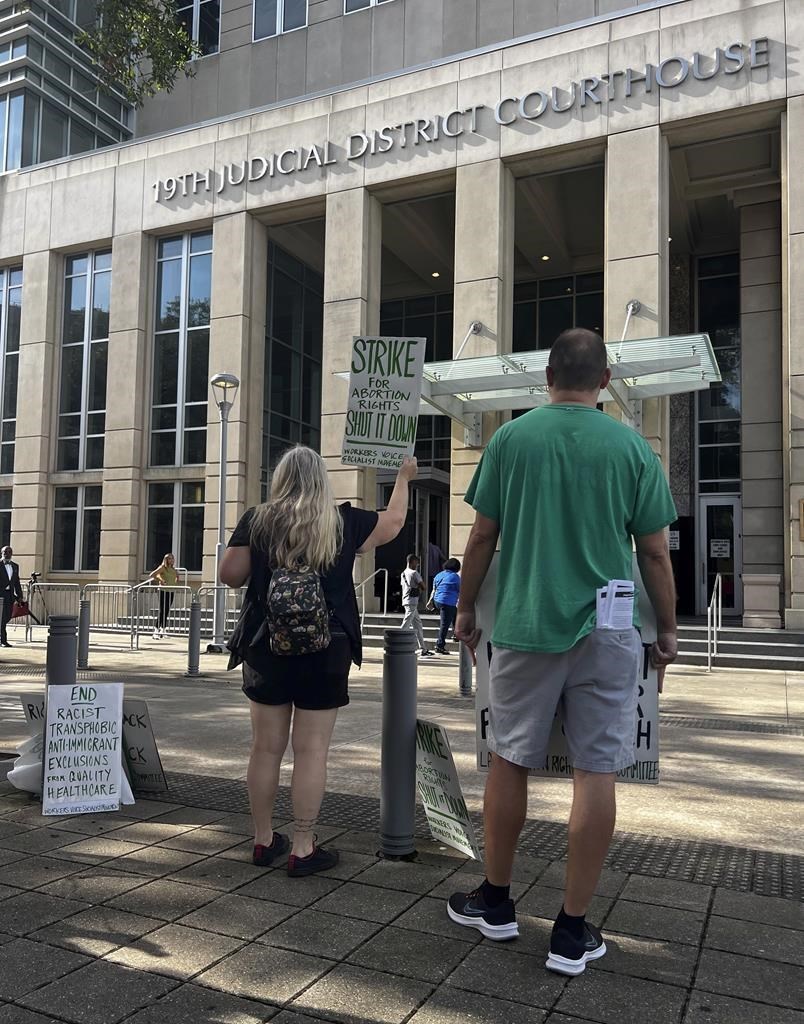BATON ROUGE (AP) — Court battles prompted by the Supreme Court's June 24 ruling reversing abortion rights played out in multiple states Monday, with a judge in West Virginia blocking that state's 150-year-old abortion ban and one in Louisiana leaving an order against enforcement of that state's ban in place, for now.
In another Monday development, the Supreme Court issued an order that put Indiana a step closer to being able to enforce a parental notification law involving girls who get abortions before they turn 18.
In West Virginia, Kanawha County Circuit Court Judge Tera L. Salango granted the Women’s Health Center of West Virginia a preliminary injunction against the 1800s-era ban, saying that in the absence of action by the court, the clinic and its patients, “especially those who are impregnated as a result of a rape or incest, are suffering irreparable harm.”
Attorney General Patrick Morrisey decried the ruling, calling it “a dark day for West Virginia.” He said his office will appeal the decision to the state Supreme Court.
Women’s Health Center lawyers argued the 19th century law is void because it has not been enforced in more than 50 years and has been superseded by a slew of modern laws regulating abortion that acknowledge a woman’s right to the procedure. One example is West Virginia’s 2015 law, which allows abortions until 20 weeks.
State attorneys argued the law has not been active in decades only because prosecuting people for getting or performing abortions would have been illegal prior to the June 24 Supreme Court decision reversing Roe v. Wade. If lawmakers wanted to repeal the 1800s-era law, they would have done so, they argued.
In Louisiana, where an abortion clinic and others are challenging the state ban, District Judge Donald Johnson left a June 11 restraining order in place. He gave both sides until Tuesday morning to submit their "proposed findings of fact and conclusions of law” in the case and gave no indication when he would finally rule.
Johnson is pondering whether to allow enforcement of the abortion ban that was written in anticipation of the U.S. Supreme Court's June 24 decision.
Whatever Johnson decides, Louisiana Attorney General Jeff Landry said he anticipates that the case will ultimately end up before the Louisiana Supreme Court.
“We believe that ultimately we will prevail and the rule of law will be upheld,” Landry said during a news conference, that was mostly drowned out by the chants of nearby protesters, following Monday's court hearing. “Those people who don’t like it have two choices — they can try to change the law, but if they find themselves in the minority of ideas then they can pack their bags and go somewhere else.”
In Indiana, a U.S. Supreme Court order put the state a step closer to being able to enforce a parental notification law involving girls who get abortions before they turn 18.
The law has been blocked for five years, but the Supreme Court ordered lower courts to take a new look at the law following the landmark June 24 decision. The order formally returned the Indiana case to lower courts that had refused to act while awaiting the judgement.
Abortion remains legal in Indiana up to about 20 weeks.
In Louisiana, there is little question that an abortion ban will eventually be in effect in the state where the Legislature has long been dominated by abortion opponents. The question as the lawsuit there progresses is when. The plaintiffs in the lawsuit are a north Louisiana abortion clinic and other supporters of legal abortion. They have managed to buy time for Louisiana's three abortion clinics, in Shreveport, Baton Rouge and New Orleans, while they argue that the current law is unconstitutionally vague.
The plaintiffs say the law has multiple, conflicting trigger mechanisms. They also argue that state law is unclear on whether it bans an abortion prior to a fertilized egg implanting in the uterus.
In addition, although the law provides an exception for “medically futile” pregnancies in cases of fetuses with fatal abnormalities, the plaintiffs argue that the criteria for what constitutes such a pregnancy is unclear.
That leaves doctors “paralyzed” in trying to decide when an abortion would be legal, attorney Joanna Wright argued for the plaintiffs.
Landry’s office argues that the state ban is constitutional and should no longer be blocked. Landry, in a filing last week, argued that the law “needs only to delineate what is illegal — not define what is legal.” John Balhoff, an attorney representing Landry, argued that the terms are clear and defined.
The lawsuit originated in New Orleans, where a judge issued a temporary order blocking enforcement of the ban June 27. Nearly two weeks later, a second New Orleans judge sent the case to Baton Rouge, saying state law required that it be heard in the capital. That move, in effect, ended the initial restraining order.
But Johnson issued a second temporary restraining order July 11.
___
Willingham reported from Charleston, West Virginia. Associated Press writers Kevin McGill in New Orleans and Mark Sherman in Washington contributed to this report.
Sara Cline And Leah Willingham, The Associated Press


